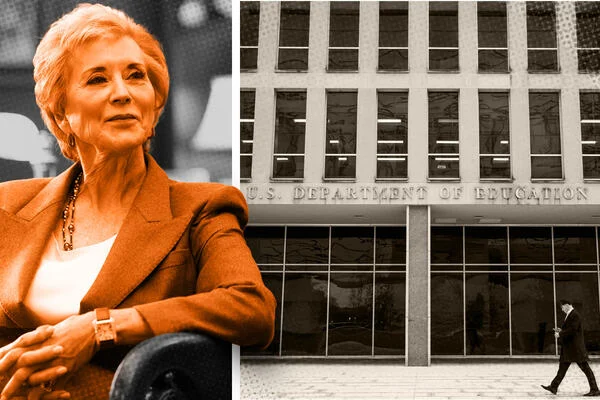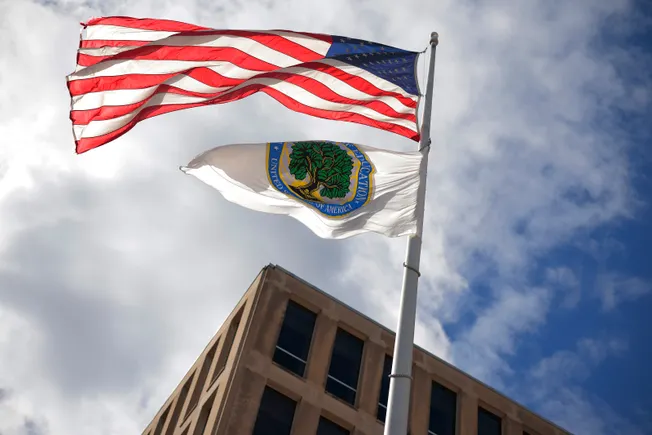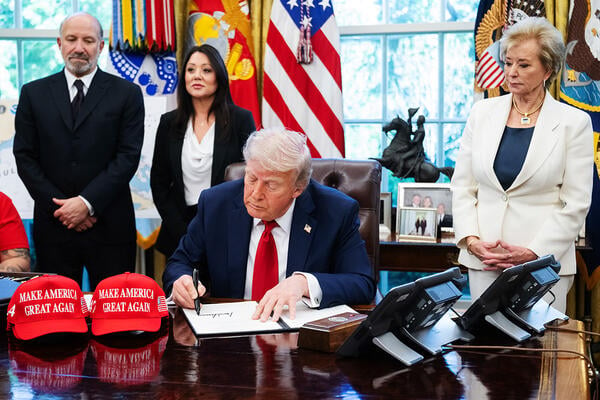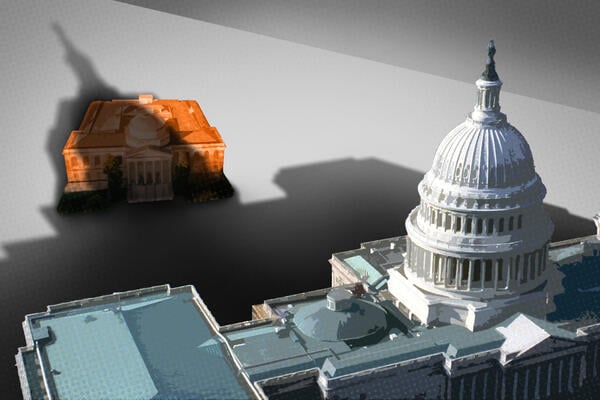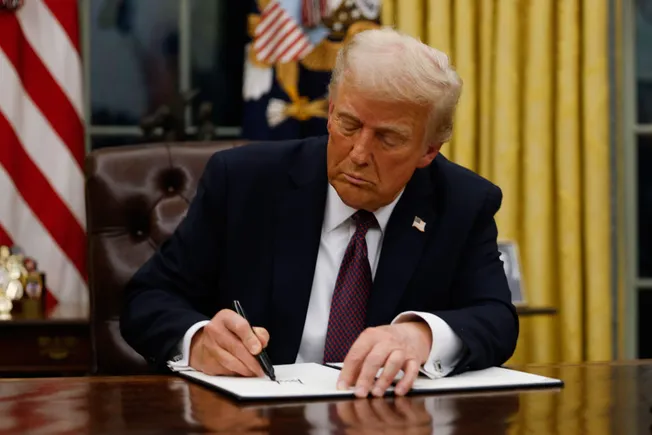President Donald Trump’s broadside against diversity, equity and inclusion has left colleges scrambling to determine how to comply—even as they juggle accreditation standards containing elements of DEI.
But even with an executive order from the Trump administration targeting “illegal” DEI programs at colleges blocked by the courts, and a Dear Colleague letter from the Education Department likely unenforceable, accreditors are treading lightly on DEI, allowing colleges leeway on complying to certain standards. If the accreditors didn’t provide such flexibility, colleges would essentially have to decide between complying with the federal government or with their accreditor—a nearly impossible situation for institutions.
Some, like the STEM accreditor ABET, have dropped DEI standards entirely. And the American Bar Association suspended enforcement of its DEI standards through August while it weighs revisions to such requirements.
As colleges feel the squeeze, some of the largest institutional accreditors have decided not to force colleges to choose between them or the Education Department, at least for now, largely telling institutions they will not be adversely affected if they fail to comply with DEI standards due to state or federal laws.
Accreditors Push Back
While accreditors allow colleges to operate with flexibility on DEI standards, some are also pushing back on the Trump administration’s crackdown, particularly the Dear Colleague letter that seeks to expand a Supreme Court opinion in the Students for Fair Admissions case, which shot down affirmative action, to ban race-conscious scholarships, programming and more.
“We would suggest that the [U.S. Department of Education’s] interpretation of SFFA is overly broad and expansive, a concern shared among legal experts,” the Council of Regional Accrediting Commissions wrote in a letter to the Trump administration Monday.
C-RAC officials added that the 14-day deadline for colleges to drop all race-conscious activities is “unreasonable” and that “the expectations for institutional actions or the methods through which institutions are expected to comply with these broad reaching requirements are unclear.”
Numerous accreditors also signed on to a letter to the department from the American Council on Education, which raised similar concerns. That letter also noted that, “however one defines DEI—and DEI is a concept that means different things to different parties—it is worth noting that the range of activities that are commonly associated with DEI are not, in and of themselves, illegal.”
Offering Flexibility
As accreditors press the Department of Education for clarity, they have also provided guidance to colleges, emphasizing that their member institutions must follow state and federal laws.
“What we have said is that they can be assured we would not take any adverse action with regard to any of our standards if the institution is attempting to follow what they believe is a legal requirement,” Larry Schall, president of the New England Commission of Higher Education, told Inside Higher Ed.
Nicole Biever, chief of staff at the Middle States Commission on Higher Education, wrote by email that the organization has notified institutions “that the Commission would never expect any institution to violate the laws or government mandates of the jurisdictions in which they operate.”
She added that MSCHE standards “will in no way inhibit” institutional compliance with the law.
Barbara Gellman-Danley, president of the Higher Learning Commission, emphasized in an email to Inside Higher Ed that institutions must comply with all members of the regulatory triad, comprised of accreditors, state governments and the federal Department of Education. If “HLC’s requirements overlap with requirements from other members of the Triad, we work with the other Triad members to identify these situations and limit the burden on the institution,” she wrote.
“HLC does not prescribe how a member institution meets HLC’s requirements,” she added. “If a requirement of another entity of the Triad may appear to limit an institution’s ability to meet HLC’s requirements in a particular manner, an institution has the flexibility within HLC’s requirements to identify other ways to demonstrate it meets HLC’s requirements.”
In guidance sent to member institutions, Western Association of Schools and Colleges Senior College and University Commission interim president Christopher Oberg noted that the Dear Colleague letter does not have the force of the law and encouraged institutions “to consult their own legal counsel to help navigate the Department’s guidance.” Oberg added that the organization “will continue to provide updates to member institutions as matters are clarified.”
The Accrediting Commission for Community and Junior Colleges has also emphasized flexibility in its guidance to members.
“It is important to note that as a federally recognized institutional accreditor, ACCJC would never require a member institution to violate state or federal laws and regulations or consumer protection clauses. As an agency, we are beholden to the federal government, state governments, and our member institutions, and work collaboratively and flexibly with those oversight partners to meet any and all regulations and communicate requirements to member institutions, as necessary,” AACJC president Mac Powell wrote by email.
What Are the DEI Standards?
Policies on DEI are as varied as the accreditors themselves, with different requirements or none at all.
For instance, NECHE’s accreditation criteria urge member institutions to address their “own goals for the achievement of diversity, equity, and inclusion” across the student body, faculty and staff.
But MSCHE’s accreditation criteria require institutions to “reflect deeply and share results on diversity, equity, and inclusion (DEI) in the context of their mission” across areas such as goals and actions, demographics, policies, processes, assessments, and resource allocation.
“One goal of DEI reflection would be to address disparate impacts on an increasingly diverse student population if discovered,” part of MSCHE’s standards reads. Elsewhere, MSCHE indicates that candidates for accreditation should have “sufficient diversity, independence, and expertise to ensure the integrity of the institution.”
Other accreditors, such as HLC, say that an accredited college should strive “to ensure that the overall composition of its faculty and staff reflects human diversity as appropriate within its mission and for the constituencies it serves.”
Others, such as programmatic accreditors, may have more exacting standards. But some accreditors, like the Southern Association of Colleges and Schools Commission on Colleges, have never included DEI criteria.
Northwest Commission on Colleges and Universities interim president Jeff Fox told Inside Higher Ed by email that it too has never officially had DEI standards as part of its accreditation requirements.
“The NWCCU has no language in the standards pertaining to DEI, and it recognizes institutions are addressing the requirements of various state and federal laws in this arena. The NWCCU supports institutions in their efforts to address the DCL as appropriate for their circumstances,” Fox wrote.
‘Very Little Danger’
Some critics, particularly on the conservative side, take a dim view of accreditors’ DEI standards. Andrew Gillen, a research fellow at the conservative Cato Institute’s Center for Educational Freedom, wrote in a recent paper that “accreditors too often abuse their power as gatekeepers” to federal financial aid, including in areas such as pushing DEI standards.
On paper, such standards look fine, he wrote to Inside Higher Ed by email. But he questions how such standards get enforced, arguing that “the problem is the interpretation of those standards. Accreditors can and do use vague standards to force radical changes on campus.”
Gillen pointed to a past conflict in 2000 when—he argued—the ABA “used innocuous and vague diversity requirements to force George Mason University Law School to discriminate in favor of Black applicants by simply rejecting anything the university did short of discriminating.”
But Gillen believes colleges face little risk if they fail to comply with accreditors’ DEI standards.
“Colleges are in very little danger so long as they follow federal civil rights laws, which have largely reverted to their original intention of promoting colorblindness,” he wrote. “Any state or accreditor that requires violating these laws will find itself in a world of legal trouble. Accreditors that ignore civil rights laws would lose their recognition from the Department of Education, and colleges that followed such requirements would also lose access to federal aid programs.”
Robert Shireman, a senior fellow at the progressive Century Foundation and a member of the National Advisory Committee on Institutional Quality and Integrity, which advises the education secretary on accreditation, downplays the notion that accreditors’ DEI standards are burdensome.
Typically, he told Inside Higher Ed, accreditors’ DEI requirements are minimal. Such standards tend to focus on inclusivity, but he notes that accreditors are “not enforcing any kind of quota.”
At a recent NACIQI meeting, he said when asked about changing DEI standards, accreditors indicated they didn’t plan to do so because “they feel that there’s nothing inappropriate about the approaches that they are taking, and they are holding firm.” He added that accreditors recognize “schools have to comply with laws, whether those laws are federal laws or state laws.”
There’s also an outstanding question on how the Trump administration is defining DEI.
“‘DEI’ has become this undefined term that gets interpreted in certain kinds of ways,” Shireman said. “And most accreditors are quite flexible in their approach to diversity, equity and inclusion.”
In a time of uncertainty, Shireman believes many institutions want to see accreditors hold firm on DEI while they push ED for guidance on terminating race-conscious activities and programming.
Shireman points to “surprise and outrage” over what he calls “an absurd perversion of civil rights laws that is happening in this administration. To read civil rights laws as prohibiting a caring approach to providing opportunity is Orwellian and it’s not appropriate. I don’t think schools support the idea of accreditors caving in to a backwards interpretation of civil rights laws.”

